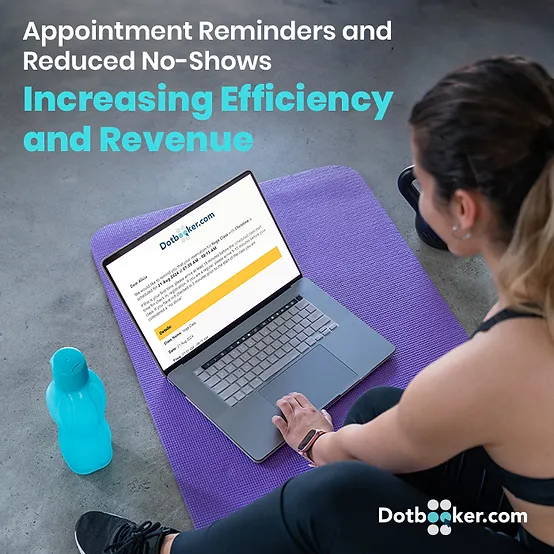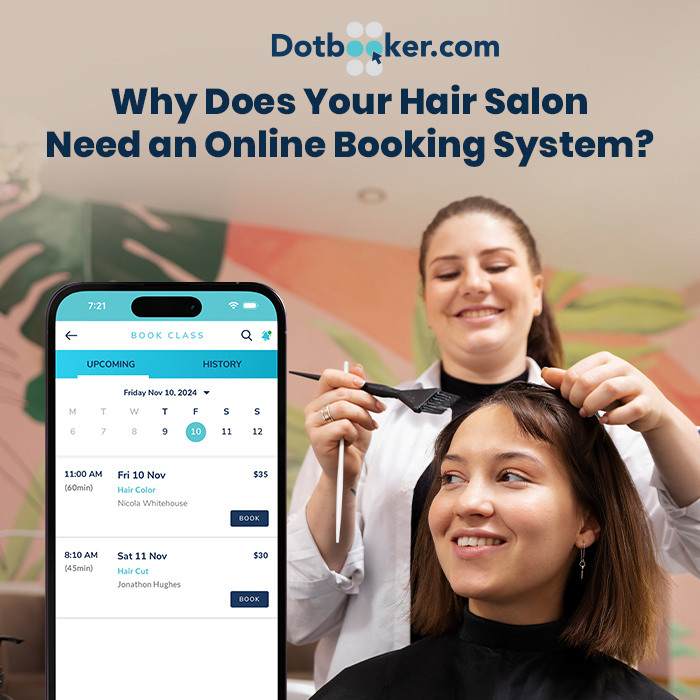
- By Dotbooker Team
- Aug 23, 2024
- 777
Say Goodbye to No-Shows: Optimize Your Wellness Appointments
Appointment no-shows big headaches for businesses. While avoidable, they’re not very easy to navigate.
These missed appointments also affect staff morale and customer satisfaction. To address this, an effective appointment reminder system is essential. Let's examine the true cost of no-shows and outline seven strategies to reduce them, improving business efficiency and revenue.
The True Cost of No-Shows for Wellness Businesses
Lost Revenue from Unfilled Appointments
Each missed appointment results in unrecoverable lost income. For wellness businesses focused on well-being, missed appointments can add up fast and have a major effect on their profits. Small businesses that depend on a consistent stream of customers to stay profitable find financial pressure to be particularly challenging. Unoccupied spaces result in lost earnings, leading to scheduling gaps that are difficult to fill on short notice.
Wasted Staff Time and Resources
Unfilled appointment slots make you underutilize your staff time. Staff members who could’ve been attending to the clients or other tasks are instead left idle, leading to unproductive time. It even disrupts scheduling for other clients and leads to the opportunity cost of not serving other clients. It could also lead to decreased staff morale because of having an unpredictable work flow. Apart from idleness, the irregularity could also lead to potential overbooking and rushed services.
Decreased Customer Satisfaction and Loyalty
No-shows have a big impact on customer satisfaction and loyalty in the wellness industry, resulting in more than just a loss of immediate revenue. If customers experience extended waiting periods or quick services because of overbooking (a strategy to prevent no-shows), it can negatively impact their perception of the company's quality and dependability. This can decrease trust and deter future bookings, affecting long-term loyalty.
Meanwhile, for the staff, no-shows create stress and unpredictability, leading to less personalized care and inconsistent service quality. Loyal customers may struggle to secure preferred time slots or notice a decline in visit quality. Of course, this would then prompt them to seek services elsewhere. When customers are unsatisfied, they are also less likely to refer and suggest your wellness business by word-of-mouth referrals. Like those in dental or medical services, ensuring employees having had accredited online doctoral programs can help improve customer satisfaction with their quality of service.
7 Effective Strategies to Reduce No-Shows and Boost Revenue
1. Implement an Automated Appointment Reminder Tool
Having an automated appointment reminder system like Dotbooker helps decrease no-shows. These tools are accessible online or on-premise, and can offer benefits to your wellness business. Appointment reminders that were automated led to a decrease of 90% in no-show rates. Automation relieves staff members from keeping on reminding clients who booked an appointment about their schedule. This wellness business management software also guarantee that reminders are consistently sent punctually. When choosing a reminder system, make sure to consider features like sending reminders through different channels (SMS, email, push notifications), customizable message templates, and compatibility with current scheduling tools.
2. Utilize Multi-Channel Reminders
Dependent solely on one communication channel for appointment reminders may not be effective. Utilizing SMS, email, and push notifications to send reminders can enhance the likelihood of your clients receiving and acknowledging the message. That’s because different clients have different communication they prefer. With that, you can offer multiple options to make sure reminders are accessible to all. This waitlist management software also lessens the chance of getting the reminders overlooked, as a client might miss an email but see an SMS or a push notification.
3. Optimize Reminder Timing and Frequency
The timing and frequency of your schedule reminders are important. Too early? They could be ignored or forgotten. Too late? Then that would already be a missed appointment. When and how often should you send reminders?
The first reminder should be 48 hours before the scheduled time. This gives your client enough time to confirm, cancel, or reschedule. The next reminder should be 24 hours before to reinforce the initial one and allow for last-minute changes. You must avoid being pushy, as that can annoy your clients. Two well-timed reminders are sufficient and more effective.
4. Personalize Reminder Messages
We are aware when we get a generic message. And we are less likely to engage with them. That’s why you should personalize your reminder messages.
How?
First, address your client by their name. This builds a connection immediately. You can set it up in your system so the messages use your client’s name.
Next, mention the specific service they booked. Importantly, include the exact time and date. If you have any additional messages you want to include, you can do so. For example, you can add your location’s address or instructions if they need to prepare anything beforehand.
5. Implement a Cancellation and Rescheduling Policy
Being clear and transparent about your cancellation and rescheduling policies is essential. Setting expectations in the online appointment booking system can assist in ensuring that clients prioritize and respect their scheduled appointments.
Here are some details you need to include:
1. The notice needed for cancellations or rescheduling. This may occur 24, 48, or longer before the set schedule.
2. Penalties (i.e. cancellation fees or forfeiting deposits) may apply for last-minute cancellations or no-shows.
3. Instructions on how to cancel or change their appointment.
4. To ensure fairness, you can make exceptions to the policy for emergencies or special circumstances.
For transparency, it’s crucial to have these policies shown to clients clearly beforehand. If you have a website, it should be displayed on a visible page or section. Common places they are included are the FAQ page or booking page.
6. Offer Incentives for Keeping Appointments
Offering incentives may help motivate clients to show up on their appointments. Some examples of these incentives could be loyalty programs that offer discounts (like 5% off on a service), complimentary services, or additional perks for regular visits. In turn, clients are inspired to attend their appointments and make it a priority. Moreover, providing slight discounts or extra services for punctual clients can strengthen good behavior. These rewards not only decrease missed appointments but also contribute to creating a dedicated clientele that appreciates your offerings.
7. Use Data Analytics to Predict and Prevent No-Shows
Data analysis can offer valuable insights into patterns of patients not showing up. By analyzing historical data, you can identify trends. For example, if you notice no-shows in specific time periods, days of the week, or customer attributes that may lead to appointment no-shows, you can find ways to mitigate them.
For instance, if your data shows most evening appointments at 7 pm are often skipped, you can try sending more frequent reminders to clients for this schedule. Another option would be to offer rewards for clients to show up, such as some discounts or vouchers. Predictive analytics aids wellness businesses in foreseeing and avoiding no-shows instead of responding to them after the fact.
Choosing the Right Appointment Reminder Solution for Your Wellness Business
Selecting the right appointment reminder system is essential for ensuring its effectiveness. Key aspects to remember include:
- Capability to send reminders simultaneously via SMS, email, and push notifications.
- Capability to personalize messages and adjust the reminder schedule to suit your business needs.
- Ensuring smooth operation by being compatible with your current scheduling and CRM systems.
- A user-friendly interface that is simple and easy not only for customers but also for your employees to use.
- Tools to monitor effectiveness and gain insights for ongoing enhancement.
Investing in a strong reminder system that fulfills these requirements will simplify operations and lessen the number of no-shows.
Measuring the Impact: KPIs for Tracking No-Show Reduction
To evaluate if your strategies are effective, you have to monitor key performance indicators (KPIs) linked to decreasing instances of no-shows.
- The proportion of scheduled appointments that are actually attended.
- The extra income obtained from filling appointments that were previously missed.
- Enhancing staff efficiency leads to a higher number of services provided and improved allocation of resources.
Conclusion
Like any business, increasing missed appointments needs to be tackled. But it’s even more important for wellness businesses that mainly rely on client bookings. Thankfully, we are at a time of advanced technology where any business can implement reminder strategies from automated systems to multi-channel reminders. Furthermore, transparent guidelines for canceling, rewards for participation, and analytics based on data also contribute to achieving this objective. The advantages in the long run of these strategies consist of improved customer satisfaction, increased efficiency in staff, and higher profits. Wellness companies are advised to implement these strategies to guarantee seamless functioning and continued expansion.
Popular Blogs

- Oct 20, 2022
- 4919

- Sep 08, 2024
- 4295

- Nov 11, 2022
- 3713

- Sep 16, 2024
- 3022
Transform your business now!

Get an expert consultation for your business's streamlined operations.